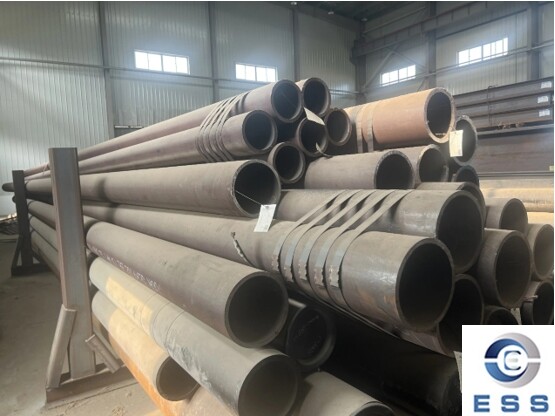
Chemical plants need to transport various
fluids and gases during the production process, including high temperature,
high pressure, corrosive substances, etc. In order to ensure the safety
and stability of the transportation process, it is crucial to choose the right
pipe material. Among them, the carbon
steel pipe is widely used due to their high strength and corrosion
resistance.
Characteristics and application scope of
carbon steel pipes
Carbon steel pipes are industrial pipes
made of carbon steel as the main raw material. According to the carbon content,
carbon steel pipes can be divided into three categories: mild
steel pipe, medium carbon steel pipe and high
carbon steel pipe. The following are its main characteristics:
1. High strength
Carbon steel pipes have high strength and
can withstand greater pressure and tensile force to ensure the safety and
stability of the transportation process.
2. Corrosion resistance
The corrosion resistance of carbon steel
pipes enables them to adapt to the complex chemical environment in chemical
plants and reduce the risk of leakage caused by corrosion.
3. Strong adaptability
Carbon steel pipes can be used to transport
various fluids and gases, including high temperature and high pressure gases
and liquids such as coal gas, oil, and steam, as well as corrosive substances
such as acids, alkalis, and salts.
4. Good ductility
Carbon steel pipes are easy to deform
during processing and can meet the needs of pipeline connections of different
shapes and requirements.
Types of chemical carbon steel pipes
1. Seamless
carbon steel pipes
Seamless carbon steel pipes are pipes made
of a whole piece of steel. They have high strength and corrosion resistance and
are often used to transport high-temperature and high-pressure fluids and
gases, such as heat exchangers, reactors, steam pipes, etc. in chemical
production.
2. Welded carbon steel pipes
Welded carbon steel pipes are mainly welded
together by welding different carbon steel plates. They have good formability
and weldability and are often used to transport low-pressure fluids and gases,
such as water
supply pipes, air ducts, drainage pipes, etc.
3. Spiral
steel pipes
Spiral steel pipes are steel pipes made by
spiral curling forming process. They have high strength and load-bearing
capacity and are suitable for transporting large-diameter low-pressure fluids
and gases, such as urban sewage pipes, oil pipelines, etc.
Recommended materials for carbon steel
pipes in chemical plants
1. Q235 carbon structural steel
Q235 carbon structural steel is a commonly
used carbon steel material that can meet the requirements of most chemical
pipelines. It has good plasticity and machinability and is easy to manufacture
and install.
2. 20# carbon structural steel
20# carbon structural steel has high
tensile strength and wear resistance, and is suitable for some high-demand
occasions, such as high-pressure pipelines and chemical equipment.
3. 16Mn carbon structural steel
16Mn carbon structural steel has good
low-temperature toughness and corrosion resistance, and is suitable for
chemical pipelines and equipment in low-temperature and high-corrosion
environments.
Application of chemical carbon steel
pipes
Chemical carbon steel pipes are widely used
in pipelines and equipment in the chemical, petroleum, natural gas,
pharmaceutical and other industries.
Advantages and disadvantages of chemical
carbon steel pipes
1. Advantages
High strength and good corrosion
resistance.
Low manufacturing and processing costs.
Can adapt to different working environments
and working pressures.
2. Disadvantages
Special requirements for high temperature
and high pressure or low temperature and low pressure cannot be met.
There are certain limitations in the
welding process.
There are restrictions for some highly
corrosive media.
How to choose the right carbon steel
pipe material
When choosing the carbon steel pipe
material for a chemical plant, the following factors should be considered:
1. Conveying medium
Choose the right carbon steel pipe material
according to the pH, temperature, pressure and other factors of the conveying
medium. For example, for highly corrosive media, a material with better
corrosion resistance should be selected.
2. Environmental conditions
Consider the process conditions, ambient
temperature, oxygen content and other factors of the chemical plant. In an
environment with high temperature, high pressure or high oxygen content, a
carbon steel pipe material that can withstand these conditions should be
selected.













 Eastern Steel Manufacturing Co.,Ltd not only improve product production and sales services, but also provide additional value-added services. As long as you need, we can complete your specific needs together.
Eastern Steel Manufacturing Co.,Ltd not only improve product production and sales services, but also provide additional value-added services. As long as you need, we can complete your specific needs together.










